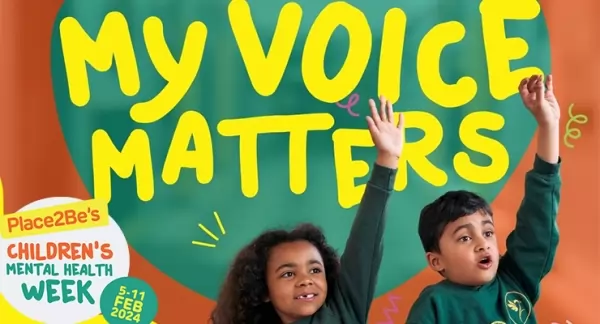My voice matters – children’s mental health week 2024

This year’s Children’s Mental Health Week is set to take place from 5th February to 11th February. It’s a week dedicated to raising awareness about children and young people’s mental health.
This annual campaign set up by the children’s mental health charity Place 2 Be, serves as a poignant reminder of the importance of understanding, addressing, and supporting the mental health needs of children and young people.
The theme: ‘My Voice Matters’
The chosen theme for this year’s Children’s Mental Health Week, 'My Voice Matters', resonates deeply with the core essence of the event. It captures the notion that every child and young person possesses a unique voice, one that deserves to be heard, valued, and empowered. By placing emphasis on the individual voices of children and young people, the campaign seeks to foster an environment where they feel safe, supported, and encouraged to express themselves authentically.
Previous themes have included Let’s Connect and Growing Together.
Raising awareness and empathy
Children’s Mental Health Week provides a crucial platform for raising awareness about the challenges, struggles, and triumphs experienced by children and young people in relation to their mental well-being. Through diverse forms of engagement, including educational initiatives, community events, and digital outreach, the week aims to inspire empathy, understanding, and action within society. Twinkl have some great Children’s Mental Health resource packs including mindful activities, reading comprehension, word searches to wellbeing journals; all of which can be easily embedded into your lesson plans. You can also check out Place2Be’s resources for schools and youth groups.
Recognising and supporting children with mental health issues
Children's mental wellness is just as crucial for their overall security and welfare as their physical health. This aspect of their growth plays a pivotal role in various life arenas — from academic achievements to social interactions and even their physical health. A child’s mental state is fluid and can alter over time, affected by a myriad of factors, both minor and major.

The significance of this issue is underscored by statistics from Childline, which reported that more than half of their counselling sessions in 2022/23 revolved around children’s mental and emotional health.
Common warning signs of mental health issues include:
- Sudden mood and behaviour changes
- Self-harming
- Unexplained physical changes, such as weight loss or gain
- Sudden poor academic behaviour or performance
- Sleeping problems
- Changes in social habits, such as withdrawal or avoidance of friends and family
If you are concerned that a child may be struggling, it's important not to wait for them to talk to you before trying to start a conversation. Encourage them to talk with you or with other trusted adults. Follow the NSPCC’s advice and guidelines on how to respond and take appropriate action with child mental health.
Mental Health for Schools CPD Course
If you haven’t already completed a CPD course in Mental Health, then this course bundle is ideal.
This course is CPD certified and it's perfect for people working in a school or any education setting and covers:
- Children’s Mental Health
- Mental Health in Schools
- Child Neglect Awareness
- Understanding Bullying
- Internet Safety in Schools
Click here to book the CPD course in Mental Health.
To view all our CPD courses click here.
For tips on how to support children’s mental health in schools, click here.
Resources
Below are some helpful links to resources for tips, guidance, and advice on Mental Health.
Children’s Mental Health Week - https://www.childrensmentalhealthweek.org.uk/
NHS Every Mind Matters - https://www.nhs.uk/every-mind-matters/supporting-others/childrens-mental-health/
Mentally Health Schools - https://www.mentallyhealthyschools.org.uk/
The Education Hub - https://educationhub.blog.gov.uk/2021/09/03/mental-health-resources-for-children-parents-carers-and-school-staff/
NSPCC - https://www.nspcc.org.uk/keeping-children-safe/childrens-mental-health/






